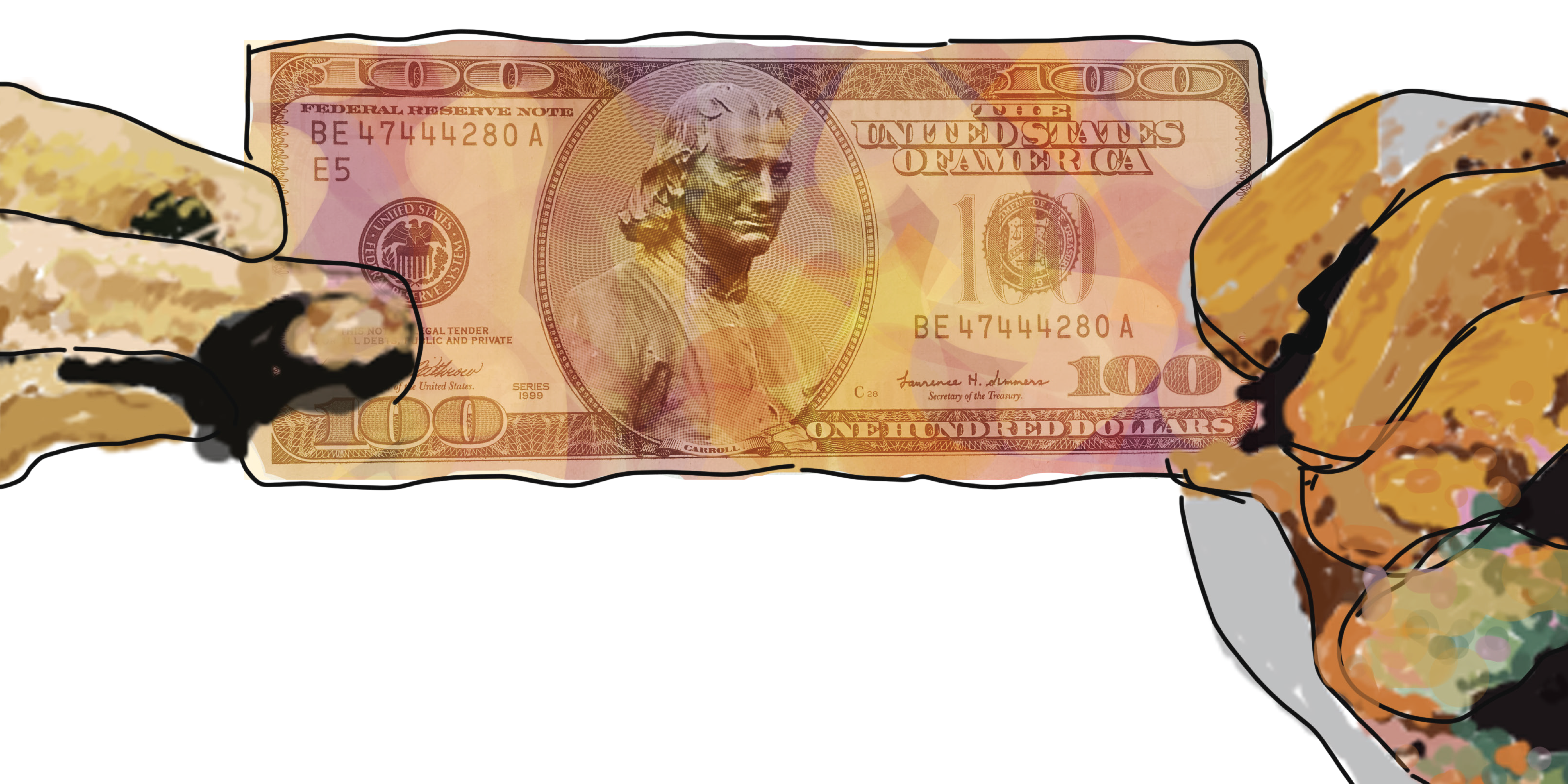Wake up, hustlers! Another day, another dollar on the Hilltop. Georgetown students are already up and at ’em, walking dogs on Prospect Street, swiping GoCards in the Southwest Quad, whipping up a hot café au lait at Uncommon Grounds. They are teaching yoga classes, delivering food, and selling their old books on Ebay. Some are still in bed after working the night shift at The Tombs or playing a late gig. For our resident hustlers, there are no days off.
Hoyas who hustle do everything from selling shampoo to DJing parties to make a little bit of extra cash. They take time out of their busy days, packed with classes, extracurriculars, internships, and jobs to help make ends meet, earn some petty cash, or support a passion.
Among the many controversial topics of the 2020 presidential race is funding higher education. Candidates, including Senators Elizabeth Warren and Bernie Sanders, have called for universal free public college in some form. Whatever may lay ahead, the current reality is that college tuition is increasing and students need to keep up. In 2015, Georgetown’s Center on Education and the Workforce reported that 70 percent of college students work paid jobs, but even students working full-time at the federal minimum wage rate often cannot earn enough to cover tuition and living expenses. With bills to pay and limited employment opportunities offered by the university, it’s no surprise many students are forced to find innovative ways to support themselves.
Christy Felix (MSB ’20) has long been one of the many driven students looking for extra sources of income. Her entrepreneurial ventures inspired her to start UHustle in the fall of 2018, with the goal of creating a platform for students to share their businesses and expand their clientele base. The website offers a variety of categories from “Academic Support,” which includes consulting and life coaching services, to “Fashion,” where student vendors can share their products and connect with potential buyers.
Felix had the idea for UHustle during her freshman spring at Cornell University, while she was grinding to balance her academic and work life while developing the network for her hair braiding business. “I kept having the same customers, which is great, but I knew I needed more customers, more people. I needed more exposure,” she said. “I was like, there should be a website or a platform for students like me where we could share what we’re doing.”
After bringing her idea to life and transferring to Georgetown, Felix packed her schedule with a full business school courseload, a work study job in the MBA admissions office, and her new hustle, UHustle, through which she makes a small profit off of every transaction. While she made a decent amount of money braiding hair, Felix sees UHustle as more than just a means to make a profit, but a way to facilitate student business transactions. Felix has a hopeful vision for how it might develop, and she anticipates that by helping students expand their businesses she will eventually make more money through UHustle than she did braiding hair. “I do believe longterm it’s going to go past $1,000 that I could have been braiding here with UHustle because I’m not going to just have 25 students at Georgetown. I’m going to have 100,000 students all around the globe.”
Felix’s work has allowed her to tap into a market of college students struggling to make some extra cash. For many of these students, side hustle earnings can make a huge impact on their bank account and provide an otherwise unavailable cushion to fall back on. For Felix, they allow her to make money while also making a difference in the lives of other students.
***
“What would you do if you had an extra $1,000 a month? What would you do if you had an extra $5,000 a month?” Olivia Jenkins (COL ’20) runs the Voice through her recruitment pitch. As a consultant for Arbonne, a network marketing company for beauty and wellness products, Jenkins earns a profit by selling her products and enlisting new members to her sales team.
Multiple streams of income can go a long way for low-income students like Jenkins. She got involved with Arbonne a year and a half ago and has been involved ever since. Last semester, she was in five classes, worked a 20-hour internship at Women for Women International, spent 15 hours at her job in Lauinger Library, and volunteered at her church on the weekends. But she found pockets of time to develop her side hustle, and at her current level as a District Manager for Arbonne, she can profit $200 to $1,000 every month. At minimum, she earns enough to pay for her groceries and transportation around D.C.
Jenkins was initially skeptical about Arbonne because network marketing businesses often have a pyramid-scheme stigma associated with them. After watching her mother and her godmother succeed in the business, she did her research and decided to try it out. “I remember when I got my first sale, and I was like, ‘What the heck? This actually works?’”
Like many other hustlers at Georgetown, Jenkins was drawn to the idea that she could be successful despite her credentials. “It doesn’t matter who I was, didn’t matter that I grew up in Washington Heights in New York. It doesn’t matter that my dad just lost his job. I was like, ‘Okay, if anybody can do this business, anyone can be me.’” she said. “So, I’m going to try it.”
Felix, raised by a single mother who has supported her family by hustling, carries herself with a similar drive. Before she got started with UHustle, she manifested her affinity for business through multiple projects. In high school, she started a skincare business and sold handmade soaps, body butters, and lotions. However, she switched her focus to braiding hair during her freshman year of college when she was looking to make an extra bit of money outside of her work study position.
Braiding just one head of hair can take up to six or seven hours, and Felix says she once started doing a customer’s hair at 2 a.m. “I made about $80 per [person] which was good,” she said. “I was doing about two, three [customers], and sometimes, if I was really dedicated, like the weekend of my birthday, I made about $1,000. I was doing them back-to-back after classes, at night.”
Though Atiyyijah Ramsey (COL ’21) and Jubilee Johnson (COL ’19) are no strangers to that kind of routine, their business narrative unfolded a bit differently. Neither woman set out to start a side hustle, but they found their natural talents could reap them some substantial benefits when friends encouraged them to sell their services.
Ramsey started making her own wigs in her junior year of high school, and even after she arrived at Georgetown, she only focused on her own hair care. It wasn’t until people started commenting on how good her hair looked that she considered applying her skills for a profit. “I never really thought about that, but then I started practicing more on some of my friends. And then I realized I was pretty good, so I put a price to it because I’m a struggling college student,” she said.
She began to hand sew wigs and charge for the wig unit itself plus installation. While balancing three jobs in the RHO, at Vital Vittles, and as an exam proctor, Ramsey gradually learned how to be most efficient in her creation process, cutting down the time it took her to make one unit from a full day to just 45 minutes. She perfected her technique, and in just one year, she has saved up over $10,000 through her side hustle.
While Ramsey started styling hair in high school, Johnson’s love for crochet dates back to elementary school, when she bought a crochet kit at the Scholastic Book Fair. As she got older, she started making stuff for herself and her friends, and, one day in her junior spring, she posted a picture of a top she made. “Someone replied to me like, ‘Oh my gosh, how much are you selling those for?’” Johnson said. “I didn’t think anything of it because I just posted it for me. So I was like, ‘Oh no, I’m actually not selling this.’ And she’s like, ‘Oh, you should. I would totally pay for this.’”
Even though she already had a work study job at the Georgetown Athletics Ticket Office, she seized the opportunity to make some extra money doing something she enjoyed. She transformed her second Instagram account into an online boutique, posting pictures of her friends modeling her knit crop tops in a range of solid hues and rainbow ombres. She made $500 in the first semester.
“That was my nice extra fun cash, like if I wanted to go out or have a little something extra. So I had my work study for primary needs like books and actual food and necessities,” she said. “Whereas the crochet, I guess it was more so like my petty cash just for fun.”
Johnson wove her string into gold doing something she already loved, much like Aliyah Williams (SFS ’20) has set out to do. Williams has been baking with her family since she was young, and it has been a defining part of her identity. When she got to college, she would often make desserts and share them with her friends, investigating different flavors like Oreo (a fan favorite) and red velvet, her most recent experiment. It was not until last semester that she thought of making a profit for her cheesecakes. Despite taking four classes, putting in hours as an event assistant for Georgetown Event Management Services and as a tutor for the Center for Social Justice’s After School Kids program through her work study, and co-directing Black Movements Dance Theatre’s upcoming show, she decided to start her business over winter break, just in time for this busy semester.
“I thought this would be a cool way to make extra income while also doing something I really enjoyed doing. But not necessarily like, ‘Oh I’m after the dollars,’” she said. “I think it’s something really, really fun, and I like being creative in that aspect and exercising my creativity in different ways.”
And then there is a different kind of culinary artist. Cue Ed Shen (MSB ’23). Like any freshman student, Shen packed his bags last August and moved into his new home on the Hilltop. But when Shen settled into his VCW room, he unpacked something most new students didn’t bring: a cotton candy machine.
He started making cotton candy for his floor in this tiny bowl, taking almost 2 minutes to make just one cone. But when people began offering to pay, his new business, SugarED, was born, and he started selling across campus. He bought a bigger, faster machine and reinvested his profits to expand his flavor options, which now include the recent additions of cherry and grape.
“My goal, I don’t think, is to make profit because if it was, I feel like there are more profitable things to do than cotton candy. But it is just like a very calming thing,” Shen said. “I feel like most people have the same connotations with it. It’s just happy. It’s like childhood. And I feel like we all need that because it’s here, and it’s hard, and it’s Georgetown.”
But when it comes to turning passion into profit, some student artists constitute a unique category of hustlers for whom getting paid is often more of a perk than an expectation. Eric Dickstein (COL ’21), vocalist and keyboardist for soul-rock band Melt, and Felix Pilkington (COL ’20), otherwise known as DJ Felix, would be performing regardless of the pay, but the extra cash is certainly a plus.
Dickstein and his friends started their band back in high school, and, even though they are currently scattered at different schools, they still tour together. The septet gets paid both for gigs and through their music on Spotify. However, Dickstein loves what he does and doesn’t need money to motivate him. In his mind, most artists would be making art despite the pay but money allows them to support themselves and continue to create.
Pilkington’s case corroborates Dickstein’s theory. Artists still have to invest time and resources into their music and find a way to sustain their creative process, even if getting paid isn’t the main goal. Pilkington has been DJing since last fall and it can make him enough money to buy groceries, reinvest in music software, or treat himself to clothes or concert tickets. But he doesn’t get paid for every gig; he only charges if the event presents itself to be more like work than fun. “For those kinds of gigs, I’d rather be paid because it feels like I’m more willing to play stuff that isn’t really my own taste that might be more appropriate,” he said.
Shen hustles to break even while doing something that makes him happy. Ramsey hustles to channel her styling skills into savings. Felix hustles because entrepreneurship is built into her DNA. Each Hoya has their own motivation for cultivating a side business, and they all benefit in some way from leaning on multiple streams of income. At the end of the day, hustling gives students more financial options that can range from some extra cash for a night out in D.C., hefty savings for the future, or a fallback plan if nothing else works out.
As Shen said, “If all else fails, I will set up shop here and just make cotton candy, like, for the rest of my life.”





